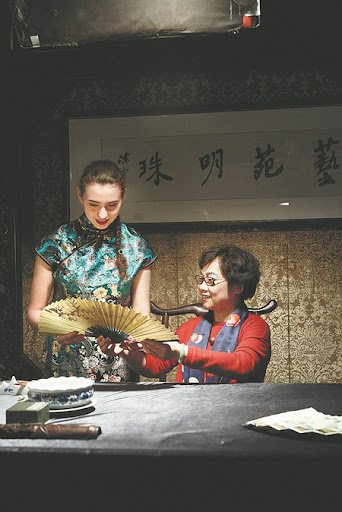Anastasia Podareva, a 28-year-old language student, has found her passion for poetry and her love for China intersecting in unexpected ways. Growing up in Ryazan, Russia, Podareva was introduced to the works of renowned Russian poets like Alexander Pushkin and Sergei Yesenin by her father. She fell in love with poetry and began writing her own poems in both Russian and English. In 2013, she came to China to pursue her language studies, and that was when she discovered the world of Chinese poetry.
As she delved deeper into Chinese poetry, she gave herself a Chinese name, Tang Xilan, which means “an orchid that blooms in the morning.” The name alludes to the Tang Dynasty, a golden age of Chinese poetry, and is inspired by The Book of Songs, the earliest collection of Chinese poetry. The power of the language and its melodious and rhythmic nature drew her to Chinese poetry, and she found herself writing her own poems in Chinese.
Podareva has had many colorful experiences in China over the past decade. She has won awards in multiple poetry writing competitions, published her own Chinese poetry collections, and participated in Chinese Poetry Conference, one of the leading poetry-themed TV programs in China. She has been able to express her passion for China and its culture through her poetry and has become a prominent figure in the Chinese poetry scene.
In a video series produced by 21st Century, a media organization affiliated with China Daily, Podareva spoke about her experiences with Chinese poetry. She remarked on the power of the language and its ability to evoke emotions and create a sense of beauty. She also noted that the earliest Chinese poetry was meant to be sung, and this musical quality is still present in much of the poetry written today.
One of Podareva’s most memorable experiences in China was when one of her poems was turned into a song. The poem, titled If, was written in early 2020, at the beginning of the COVID-19 pandemic. The song was performed by Podareva herself, and it was an unforgettable moment for her. It was a testament to the power of poetry and music to connect people across cultures and languages.
Podareva’s passion for Chinese poetry has led her to write poems on a wide range of topics, from love and nature to current events and social issues. She hopes to continue to share her love for China and its culture through her poetry and to inspire others to appreciate the beauty of Chinese poetry.
As Podareva continues her language studies in China, she is excited to see where her passion for poetry will take her. She hopes to continue to grow as a poet and to use her art to bridge cultural divides and promote understanding between different cultures. Her love for poetry has taken her on a unique journey, and she is excited to see where it will take her next.
Podareva, a young poet and painter from Russia, was inspired by China’s unity during times of adversity. She wanted to create something positive to help boost people’s spirits during difficult times. Podareva expresses her feelings about China through different styles of verse, rather than just straightforward praise. She wrote a poem depicting the friendship between China and Russia, showing her support for her adopted home. The poem was published online and picked up by Zhu Hai, a music lover in Wenzhou, Zhejiang province.
Zhu put the poem to music and contacted Podareva through her school. Last month, the two finally met in person in Shanghai, three years after speaking with each other for the first time, and recorded If together in a studio, with Podareva singing and Zhu accompanying her with a harmonica. Podareva believes that singing is the ultimate way of expressing Chinese poetry, as the language rises, falls and flows like music.
To Podareva, the meeting with Zhu didn’t just stop at poetry. It’s a microcosm of the friendship between China and Russia. Podareva has always wanted to be a cultural ambassador between the two countries. In 2020, she created accounts on video-sharing websites in China, such as Bilibili and Douyin, and started making videos. Besides sharing new Chinese poems that she’d written, Podareva would also produce content based on cultural comparisons.
Podareva believes that literature is a great way to develop mutual understanding between China and Russia. By looking at the literature of a certain nationality, one can learn a lot about its culture and customs. Being a young social media content creator, Podareva also makes humorous videos that demystify some of the misunderstandings that Chinese people have towards Russians.
Apart from writing poetry, Podareva has also been painting since studying for her master’s degree in art theory at Zhejiang Sci-Tech University in Hangzhou. She doesn’t think the two art forms are that different from each other, offering the example of Wang Wei, another great Tang Dynasty poet, who was also a painter.
Podareva’s painting style is mainly abstract, while she tends to leave some gaps in her poems so that readers can fill them with their own imagination. She held a solo exhibition at Changshuo Cultural Center in Shanghai with 66 of her paintings on display. Podareva says she hopes that, in the future, she can open accounts on Russian social media sites, uploading videos that introduce China through her poetry and paintings to her own compatriots.
Podareva’s goal is to strengthen the friendship between the two countries, just like what she has been doing in China for the past three years. She hopes that her work will allow the friendship between the two peoples to bloom, like an orchid. All art, regardless of form, is a way for the creator to express their soul, according to Podareva. She believes that the language of poetry and painting can transcend cultural differences and bring people together.
Read More:
